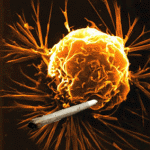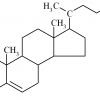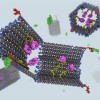Addicted cancers
 Most people know that smoking is a hard habit to kick because smokers become addicted to the nicotine and habit. Equally sad is the tendency of young adolescents to start smoking for social and psychological reasons.
Most people know that smoking is a hard habit to kick because smokers become addicted to the nicotine and habit. Equally sad is the tendency of young adolescents to start smoking for social and psychological reasons.
In a turn-around of sorts, it may be comforting to know that cancers can become addicted, too. Cancer cells have many different genetic changes, as well as changes in the expression of genes that are not due to mutations called epigenetic changes. Although cancer cells do have many differences from normal cells, they are still very similar to normal cells, making it very difficult to find treatments for cancers that don’t have serious side-effects.
Scientists, however, are beginning to identify genes that appear to be “Achilles heels” for cancers. It turns out that in many cases, reversing a defect in just one gene can have a profound effect on the growth of a cancer. Genes that promote cancer when mutated are called oncogenes, so this dependence on a particular genetic change in a cancer is called “oncogene addiction.” Often, treating these changes can be accomplished with little effect on normal cells, because the biology of cancer cells and normal cells has different wiring. So, a cancer cell may need to express a particular protein to keep dividing, while a normal cell might have other ways to keep going.
For instance, HER-2 is a receptor that is expressed on the surface of many breast cancers. HER-2 expressing cancers are often dependant on HER-2 to keep growing. This dependence is exploited in breast cancer treatments by an antibody drug, called Herceptin, which binds and inhibits HER-2.
Just as you can bring a cigarette smoker to their knees by taking away nicotine, so some cancers are tamed by taking away their favorite oncogene. Unfortunately, just like cigarette smokers who turn to other ways to cope, like caffeine or (more healthily) exercise, cancer cells can also escape their addictions, but that is another story…
| Print article | This entry was posted by Bruce Nash on June 9, 2010 at 9:54 am, and is filed under Inside Cancer. Follow any responses to this post through RSS 2.0. You can skip to the end and leave a response. Pinging is currently not allowed. |










